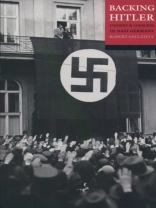The Nazis never won a majority in free elections, but soon after Hitler took power most people turned away from democracy and backed the Nazi regime. Hitler won growing support even as he established the secret police (Gestapo) and concentration camps. What has been in dispute for over fifty years is what the Germans knew about these camps, and in what ways were they involved in the persecution of ‘race enemies’, slave workers, andsocial outsiders. To answer these questions, and to explore the public sides of Nazi persecution, Robert Gellately has consulted an array of primary documents. He argues that the Nazis did not cloak their radical approaches to ‘law and order’ in utter secrecy, but played them up in the press and loudly proclaimed the superiority of their system over all others. They publicized their views by drawing on popular images, cherished German ideals, and long held phobias, and were able to win over converts to theircause. The author traces the story from 1933, and shows how war and especially the prospect of defeat radicalized Nazism. As the country spiralled toward defeat, Germans for the most part held on stubbornly. For anyone who contemplated surrender or resistance, terror became the order of theday.
Robert Gellately
Backing Hitler [PDF ebook]
Consent and Coercion in Nazi Germany
Backing Hitler [PDF ebook]
Consent and Coercion in Nazi Germany
购买此电子书可免费获赠一本!
语言 英语 ● 格式 PDF ● ISBN 9780191542374 ● 出版者 Oxford University Press ● 发布时间 2001 ● 下载 3 时 ● 货币 EUR ● ID 8542993 ● 复制保护 Adobe DRM
需要具备DRM功能的电子书阅读器












